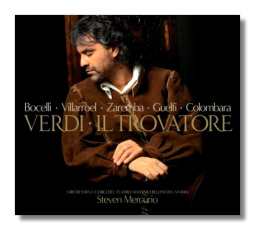
The Internet's Premier Classical Music Source
Related Links
- Verdi Reviews
- Latest Reviews
- More Reviews
-
By Composer
-
Collections
DVD & Blu-ray
Books
Concert Reviews
Articles/Interviews
Software
Audio
Search Amazon
Recommended Links
Site News
 CD Review
CD Review
Giuseppe Verdi

Il trovatore
- Andrea Bocelli (Manrico)
- Verónica Villarroel (Leonora)
- Elena Zaremba (Azucena)
- Carlo Guelfi (Il Conte di Luna)
- Carlo Colombara (Ferrando)
Orchestra & Chorus of the Teatro Massimo Bellini di Catania/Steven Mercurio
Decca 475366-2 DDD 2CDs: 70:57, 68:06
Just the name "Andrea Bocelli" is enough to set listeners swooning and critics cursing, so I thought it would be good to try and tell the truth: when he's good (that is to say, when he's singing appropriate repertoire), he's very good. When he's bad, he's still not the disgrace that many critics have made him out to be. As always, the reality lies somewhere in between the two extremes.
It is has been said about Il trovatore is that all it needs is the four greatest singers in the world. Well, the days are long gone where a cast close to that was at least within reach, but that shouldn't keep us from enjoying what might be the most garish of Verdi's mature operas. Even Verdi said that he didn't write this one for the critics but for everyday people, so perhaps he would see the logic behind having one of the world's most popular tenors sing the title role, even if it isn't quite right for him.
And it isn't. Manrico is a heavier role than the Duke in Rigoletto and Alfredo in La traviata – two roles for which Bocelli is better suited. Bocelli doesn't have the heft needed for the score's confrontational moments, although "Ah! sì, ben mio" and the Miserere are just fine. There's a lot of ungainly forcing going on here, and a little bit of crafty faking too. Having said that, there's something very appealing about Bocelli's vocal personality, even when he is abusing his voice, so I enjoyed his portrayal, even though it made me shake my head much of the time.
His colleagues show him up, and yet it isn't for them that most people will be buying this set! Smoky-voiced Verónica Villarroel has put some Callas mannerisms into her Leonora, but at least her singing isn't anonymous, and much of the time she is exciting. The coloratura in her Act One cabaletta proves to be her Achilles heel, however. She sang this role with tenor José Cura at the Royal Opera House in London – a production preserved on a BBC/Opus Arte DVD also reviewed by me (positively) on this site. Carlo Guelfi's Count di Luna is an angry shouter, but again, here's another performance that doesn't disappear into the woodwork – this is good old-fashioned thud-and-blunder Verdi singing. The same goes for Zaremba's let-it-all-hang-out Azucena. Zaremba is what some wags call a "biker" mezzo; anything but old and frail, it sounds like she could put the Count di Luna in a judo hold in five seconds. She and Guelfi are probably the most outstanding contributors to this recording, even though one could hardly call their singing subtle. Colombara is a just okay Ferrando. The comprimarios and chorus are even less than wonderful. Mercurio conducts heavily and with not a great deal of imagination. It has been said that the orchestra in this opera is like the strumming of a giant guitar, and perhaps Mercurio has taken that comment too literally, mistaking unimaginativeness for steady support.
The engineering is very nice in this recording, which dates from 2001. (Why the delay?) The libretto reproduces only some (!) of the opera's text, plus an English translation. If you want a complete libretto, you'll need a PC, because it's all on the first CD. I don't like this practice, but I guess it's better than no libretto at all.
Copyright © 2004, Raymond Tuttle


















